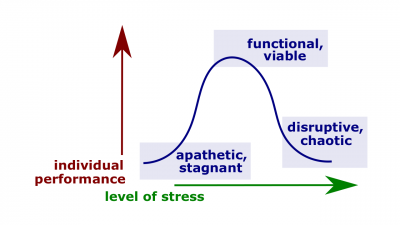Difference between revisions of "Psychological stress"
(Created page with "400px|thumb|right|[[Psychological stress]]In psychology, stress (hereinafter, the ''Stress'') is a feeling of s...") |
|||
| Line 1: | Line 1: | ||
| − | [[File:Stress-vs-performance.png|400px|thumb|right|[[Psychological stress]]]] | + | [[File:Stress-vs-performance.png|400px|thumb|right|[[Psychological stress]]]][[Psychological stress]] (or, simply, [[stress]]; hereinafter, the ''Stress'') is a feeling of strain and pressure. This feeling emerges as a response to one or more [[stressor]]s or a lack of those. The reaction can possibly be pleasant, but the term, [[psychological stress]], is usually used to describe unpleasant ones because constant and unpleasant reactions can cause serious health conditions. Some researches argue that human beings need some level of [[psychological stress]] in order to function normally. |
==Related concepts== | ==Related concepts== | ||
Revision as of 07:51, 3 December 2018
Psychological stress (or, simply, stress; hereinafter, the Stress) is a feeling of strain and pressure. This feeling emerges as a response to one or more stressors or a lack of those. The reaction can possibly be pleasant, but the term, psychological stress, is usually used to describe unpleasant ones because constant and unpleasant reactions can cause serious health conditions. Some researches argue that human beings need some level of psychological stress in order to function normally.
Related concepts
- Stress administration. Practice and a set of concepts, based on that practice, that define culture of coping or dealing effectively with psychological stress.
- Need. (1) Something that is wanted or required; (2) Circumstances in which something is necessary, or that require some course of action.
- Change risk. A risk, positive and/or negative, of some change.
